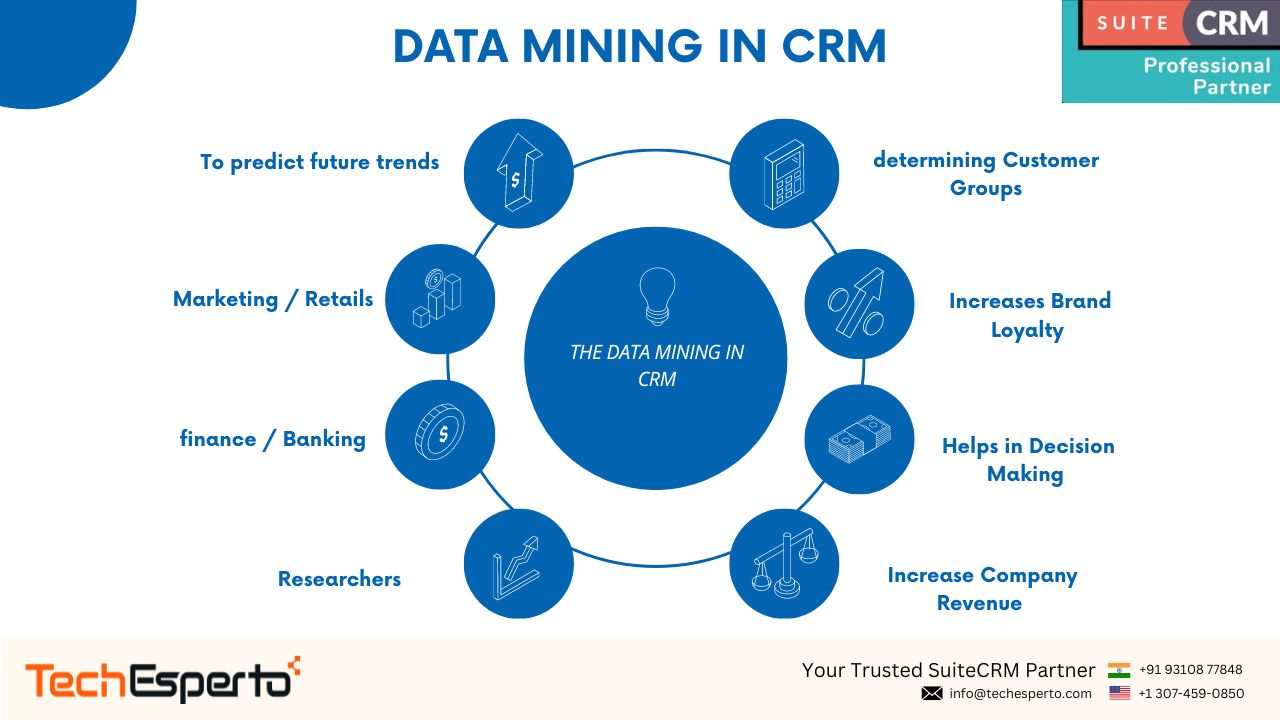Data mining in CRM (Customer Relationship Management) is a powerful technique used to extract valuable insights from vast customer data. By analyzing patterns, trends, and behaviors, data mining helps businesses make informed decisions, optimize customer interactions, and improve overall satisfaction. In this blog, we will explore the importance of data mining in CRM, how it works, and how businesses can leverage it to enhance customer relationships and drive growth.
What is Data Mining in CRM?
Data mining refers to the process of analyzing large datasets to discover meaningful patterns, trends, and relationships that can provide valuable business insights. In CRM, data mining helps companies sift through vast amounts of customer data to identify actionable information that can be used for decision-making, improving marketing strategies, and personalizing customer experiences.
Data mining techniques in CRM include clustering, classification, association, and regression, which allow businesses to segment customers, predict behaviors, and optimize marketing efforts.
Benefits of Data Mining in CRM
1. Improved Customer Segmentation
Data mining allows businesses to group customers into distinct segments based on shared behaviors, preferences, and demographics. This enables more targeted marketing campaigns, allowing businesses to deliver personalized messages and offers to specific customer groups. Better segmentation leads to higher engagement and increased customer satisfaction.
2. Predicting Customer Behavior
By analyzing historical customer data, data mining can help businesses predict future behaviors, such as purchasing patterns, product preferences, and likelihood of churn. Predictive modeling allows businesses to proactively address customer needs and design personalized offers or loyalty programs, ultimately improving retention and sales.
3. Personalized Marketing
Data mining in CRM enables businesses to create personalized marketing strategies by understanding individual customer preferences and behaviors. With insights gained from data mining, businesses can offer more relevant product recommendations, targeted email campaigns, and customized promotions, improving the effectiveness of marketing efforts.
4. Optimizing Sales and Marketing Strategies
Data mining helps identify the most effective marketing channels, sales tactics, and customer touchpoints. By analyzing customer journeys and interactions, businesses can adjust their strategies to maximize ROI, allocate resources more effectively, and focus on high-value leads.
5. Enhancing Customer Retention
Through data mining, businesses can identify warning signs of customer dissatisfaction or churn. By recognizing these patterns early, companies can take proactive steps to improve the customer experience, offer personalized retention efforts, and reduce churn rates, which boosts long-term customer loyalty.
Data Mining Techniques in CRM
Here are some common data mining techniques used in CRM to unlock valuable insights:
1. Clustering
Clustering is a technique used to group customers with similar characteristics into segments. It helps identify distinct customer groups, such as frequent buyers, budget-conscious shoppers, or high-spending customers, enabling businesses to create targeted marketing strategies for each group.
2. Classification
Classification involves categorizing customers based on predefined criteria, such as customer value, purchase history, or engagement levels. This helps in developing personalized marketing efforts and prioritizing customer interactions.
3. Association
Association mining finds relationships between different variables in customer data, such as purchasing behaviors or product combinations. It can be used to offer relevant cross-sell or upsell recommendations, improving sales and customer satisfaction.
4. Regression
Regression analysis predicts the likelihood of future customer behaviors based on historical data. For example, it can help predict how likely a customer is to make a purchase after receiving an email campaign, allowing businesses to fine-tune their communication strategies.
Conclusion
Data mining in CRM is essential for businesses looking to unlock the full potential of their customer data. By leveraging data mining techniques, companies can gain valuable insights, improve customer segmentation, predict behaviors, and optimize marketing efforts. This leads to more personalized experiences, higher engagement, better customer retention, and ultimately, improved business performance. As customer data continues to grow, incorporating data mining into CRM systems will become a critical competitive advantage for businesses across industries.



